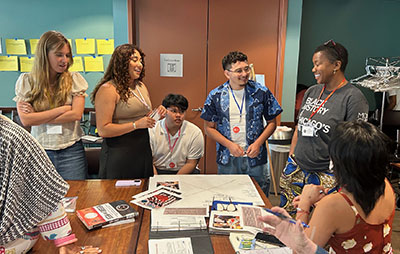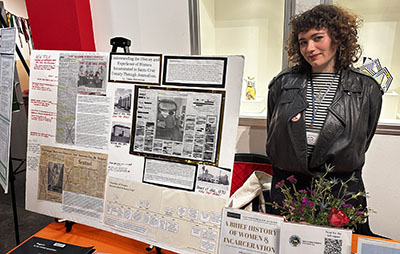Campus News
Employing Humanities: Bridging the gap between the classroom and the workforce
Launched just a year ago, the Employing Humanities initiative at the University of California, Santa Cruz is already transforming the lives of undergraduate students. The initiative was made possible by a $1 million grant from the Mellon Foundation and is led by Humanities Dean Jasmine Alinder.


Launched just a year ago, the Employing Humanities initiative at the University of California, Santa Cruz is already transforming the lives of undergraduate students.
Through this initiative, students in the Humanities Division gain the practical skills and professional connections needed to thrive in diverse career paths. By connecting them to hands-on internships, the initiative provides invaluable workforce experience while laying a strong foundation for advanced studies.
A growing initiative with an oversized impact
The initiative was made possible by a $1 million grant from the Mellon Foundation and is led by Humanities Dean Jasmine Alinder. In the 2023-24 academic year alone, 83 humanities students participated in 89 internships and research positions.
These opportunities spanned a wide range of academic departments, research projects, and community organizations, including Save our Shores, United Way of Santa Cruz County, and the Community Foundation of Santa Cruz County.
“The aim of Employing Humanities is to equip students with the skills they need to succeed as leaders—not only in professional and academic settings but in communities as well,” said Assistant Director of Experiential Learning Kylie Rachwalski.
The initiative’s impact continues to grow, with plans for 39 internships at 27 community organizations and about 75 undergraduate research positions across 30 faculty-led projects in the 2024-25 academic year.
These positions are a continuation of successful partnerships from the previous year, with new research projects added from departments such as Critical Race & Ethnic Studies, History, Literature, and Languages and Applied Linguistics.
Connecting Humanities to the real world
At the heart of the Employing Humanities initiative is a commitment to experiential learning. By connecting students to both academic research and off-campus internships, the program bridges the gap between the classroom and real-world applications. The internships and research positions allow students to apply the knowledge and skills they’ve gained in their courses to tangible, impactful work in their communities.
“We’re not just teaching students the value of a humanities degree,” Alinder said. “We’re showing them how to apply it in ways that make a real difference in society—whether that’s through public education, community engagement, or advancing social justice.”
The initiative has had a significant impact on students from diverse backgrounds.
Forty percent of participants come from underrepresented groups, and a quarter are first-generation, low-income students.
The cohort from the first year includes 31 percent Latinx, 25 percent Asian, and 8 percent African American/Black students, underscoring the program’s commitment to inclusivity and diversity.
Humanities EXPLORE and EXCEL programs
Central to the Employing Humanities initiative are two key programs: EXPLORE and EXCEL.
Humanities EXPLORE offers students the opportunity to join faculty-led research projects, where they gain mentorship and hands-on experience. Students commit to 100 hours of work per quarter.
“Experiential learning challenges the idea that humanities degrees aren’t practical for the job market,” said UC Santa Cruz Assistant Professor Josefina Bittar Prieto, a faculty mentor in the EXPLORE program. “Students are using skills developed in the classroom to take on a wide range of tasks, both in academia and beyond.” Professor Prieto’s EXPLORE fellows helped build and publish a database of interviews in Paraguayan Spanish and Guarani to include in the California Language Archive.
Humanities EXCEL places students in off-campus internships with community organizations, where they can develop practical skills while contributing to social change. Fellows work 10–20 hours a week. The EXCEL program builds on the success of The Humanities Institute’s Undergraduate Public Fellows Program.
Fellows in both the EXPLORE and EXCEL programs earn $20 an hour, which is key to ensuring that these opportunities are accessible to all humanities students. In addition to the Humanities Division and The Humanities Institute, these experiential learning positions are generously supported by The Mellon Foundation, The Helen and Will Webster Foundation, The Sikh Foundation, and Michael Stern.
Real-world impact: student experiences
Participants consistently report that the program enhances both their academic and professional lives. According to a recent survey, 80 percent of students said they applied what they had learned in their humanities courses to their internships or research projects.
“I feel like my degree in History helped me understand the significance of museums as a mode of public education,” said Sebastian Zamora (History, ’24), who interned at the Santa Cruz Museum of Art & History. “My strong background in the humanities helped me contribute to an accessible, inclusive learning environment.”
For Liana Stevenson (Literature, ’24), who interned at the Santa Cruz Public Libraries, the EXCEL program provided invaluable insight into how storytelling can drive social change. “This project helped me understand the power of storytelling to affect change in local communities,” she said.
Faculty-led research: deepening understanding
In addition to internships, the Employing Humanities initiative also supports undergraduate research. This summer, Alinder led a group of five students to a National Endowment for the Humanities (NEH)-funded K-12 Teacher Institute in Chicago to study Japanese-American incarceration and resettlement. The students, who were involved in creating educational resources for K-12 teachers across the country to bring back to their classrooms, gained a deeper understanding of how this often overlooked history could be integrated into school curriculum.
Benyamin Alfaro (2024 EXPLORE researcher) has been deeply involved in researching primary sources for this project. “Being part of a project that deepens understanding of Japanese-American internment is an honor,” he said. “Knowing this work will impact educators and students nationwide motivates us to keep finding ways to support teachers.”
Empowering future leaders
The Employing Humanities initiative is more than just an initiative for career preparation. It’s about cultivating well-rounded, empathetic leaders with critical thinking skills who can thrive in academic, professional, and community settings. As the programs continue to expand, they will remain committed to empowering students to use their humanities education to make a tangible difference in the world.
The Employing Humanities initiative is part of a larger effort to redefine the role of the humanities in modern education.
“By providing students with real-world experiences that connect their academic learning to societal needs, the initiative is proving that a humanities degree is not just valuable—it’s vital, and it provides excellent preparation for a host of careers after graduation,” Alinder said.
“With plans to expand to new community partners and increase opportunities for transfer students, Employing Humanities is setting a high bar for what humanities education can achieve,” Alinder continued. “It’s more than just internships and research positions; it’s a movement to show that students do not need to choose between studying the humanities and making themselves career-ready. They can do both here at UC Santa Cruz in ways that are impactful, relevant, and well-paid.”
Dean Alinder’s goal is to be able to offer an experiential learning opportunity to every student majoring or minoring in the Humanities.
Join UC Santa Cruz’s Humanities Division faculty, staff, students, and alumni in the continued reimagining of the world through the transformative power of humanities education. A gift to the Employing Humanities Fund would have a powerful and direct impact on our students’ academic and future success.